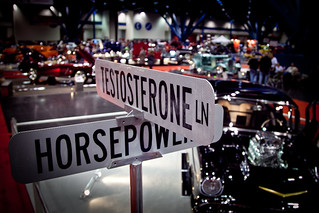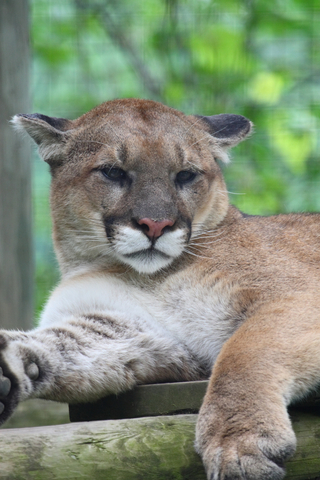Guyside: what the Michael Sam backlash teaches us about us
If it hadn’t been for two men kissing, I doubt I would have taken any notice at all of the NFL draft last week. While there are lots of people in Canada who are big NFL fans, I’m not; frankly, if I’m watching football, I’m watching the Canadian game, with its bigger field, fewer downs, and more freewheeling style. But I’m not here to talk about our superior game.
The big story out of this year’s NFL draft was the selection of Texan Michael Sam by the St. Louis Rams. Or, more precisely, the big story was the video of Sam sharing a celebratory kiss and hug with his boyfriend Vito Cammisano (who, Wikipedia tells me, is also an accomplished athlete.)
Miami Dolphins safety Don Jones tweeted the word “horrible.” Others criticized ESPN for broadcasting the display of affection, saying “kids are watching.” A former Ole Miss basketball player tweeted that he was boycotting ESPN because his 7 and 11-year-old brothers were exposed to the video clip, then after being subject to a large backlash, said that his tweets had been part of a friend’s psychology project.
Suffice it to say that there was a lot of shock and horror that this athlete would engage in a display of same-sex affection on camera, and that it would be broadcast.
My friend Joe wrote about how he talked with his daughter about this, and it got me thinking about us heterosexual guys and our complicated relationship with gayness. When I was a kid, the worst thing that you could call another guy was one of the pejorative terms for “gay:” fruit, faggot, fairy. And certainly in my world of popular culture in the 1970s and 1980s, there were very few examples of gay men. It was known that Elton John was gay. There were rumours about David Bowie. But certainly there were no out gay men in my world, and I never met someone who was out until I went to university in 1983.
Things have changed since then. I now count many GLBT people as both casual and deep friends, and I’m part of one of city’s major events for the GLBTQ community. So what have I learned? First off, none of that has led me towards changing my sexual orientation. I’m as straight as I was in my teens, or even back further than that (if you can have a sexual orientation at that age.)
Second, I can’t imagine a set of circumstances that would turn me from a guy who likes women to a guy who likes other guys. And that lack of imagination has led me to believe that it’s unlikely circumstances exist that would change a woman who loves other women to a woman who loves men, etc. So I can’t get behind the idea that someone (child or adult) seeing two men kiss on television is going to be “twisted,” “scarred,” etc. I also don’t see how it’s difficult to explain that behaviour to a kid — “Those guys? They love each other, so they’re kissing. Some guys love other guys.” Apparently, I’m not the only one.
Third, objecting to something does not mean you get to be insulated from that’s thing’s existence. Nobody has the right to tell you that your opinion on gay men is wrong. But you don’t have a right to never see or be exposed to gay men in your life, and it would be a lot easier for everyone if you can say to yourself and others “The Bible tells me that homosexuality is wrong.”
Finally, we straight guys have to get past the double standard that seems to exist around gay men. I don’t think I need to tell you that there’s a lot of attention paid to women kissing women — and men watching them. But when it comes to men kissing men, there’s what many would say is a visceral reaction of revulsion. I believe that reaction is learned and reinforced by society. (And to be clear, I have no evidence to support that beyond that of my own life.) We are taught to be revolted by it. We then write scripts to justify it, that often involve either direct damage (based on the broadly-debunked belief that homosexuality and pedophilia are related) or psychological damage or scarring (based on the broadly-debunked belief that gayness can be “taught.”)
We need to accept people and things and behaviour at face value. Two guys kiss? Yup, they kissed. No more than that. A guy likes guys? Yup. As men, let’s get past the taunts and the immaturity that we grew up with around this stuff.
Read MoreGuyside: Who’s MY cougar?
My kindly employer here asked the provocative question “Who’s your cougar?” earlier this week. When you read Liz’s post, you get a sense of the complex set of meanings surrounding the term “cougar”, as well as the minefield of assumptions and sexual mores that surround the people who are identified by self or others as cougars. So I thought I’d take on the question of the cougar from the guyside.
(Cougar not exactly as shown in video)
If you had asked me as a teenager whether cougars were good or bad — I likely would have been heartily in favour of them (if I would have believed they existed, as opposed to being mythological creatures like the Sirens). Anything that would have increased the chance of a little lovin’ would have been okay with me at that point. And being as timid a young man as I was, it would have taken more than the average amount of sexual aggression to turn me into “prey.” But by now, from the perspective of a long-term monogamous relationship, I see the term and those who bear it a bit differently (and, I hope, with a bit more subtlety).
Certainly, I think that there’s a double standard. I’ve seen some men I know move towards dating younger women as they age; it seems as if the age of the women they pursue remains static while their age advances year by year. Most of the time, that behavior is accepted without a second thought. A woman doing the same thing would quite likely not be given the same pass.
It also seems to me that the term “cougar” is very much tied to straight women. Some googling (which turned up some rather, er, explicit results) left me with one example of someone referring to a lesbian cougar. The person singled out? Ellen Degeneres. A quick search of Degeneres found that she had had a relationship with a woman 1o years younger than her, then later married a woman 15 years younger. Not exactly predatory, by my judgement.
What I think as I approach my sixth decade on the planet is this: there’s a big, complicated world out there. If two people find each other, and want to spend some fun-time together, good for them. If they want to spend a life together, good for them too. If you’re both adults (heck, I don’t even much care if three people or four or more are involved; that’s not my thing, but …) and not hurting anyone else in the process, then seek out whatever type of relationship provides you with fulfillment and happiness.
If calling a woman a “cougar” is simply a way to characterize her choice of younger sexual partners, that’s fine. But I think the levels of judgement that seem to accrue to those women make me more than a little uncomfortable using that term. Maybe I’m naive or idealistic, but I think we’re all a little bit more than our genitals.
Read MoreWho’s your cougar?
When you hear the term ‘cougar,’ what do you think of? The stereotypical older woman who prowls on unsuspecting young men? The powerful, wealthy woman who can attract young cubs to their fold simply because she can afford to look younger and has money to burn? The older, unmarried woman who only knows how to express her sexuality by publicly pursuing young men for sex?
Or, all of the above?
As women, we often get a bad rap when it comes to expressing our sexuality. So, I find it intriguing that social researchers have started to pay attention to the cougar moniker and whether or not it is a pejorative or a positive vision that expresses that women continue to have sex lives beyond the age of 40.
According to novel research published in the Journal of Aging Studies, the term ‘cougar’ originated with the launch of a dating website geared toward matching older women and younger men, noting that “the story is that one of the two women who founded the website was told by a nephew that the two ladies were like cougars in search of small, defenseless animals.” Since that time, various websites have been launched, annual Cougar Conventions held and hit television series (Cougar Town) broadcast.
Interestingly, it’s only recently that there has been a renewed interest in women’s sexuality in midlife and lord knows, I’ve explored the topic in great detail on FlashFree. However, stereotypes of women losing their sexual desirability, coupled with the overarching notion that women in menopause are equal to women who are sexually dysfunctional leaves little to the imagination or to reality; as the researchers point out, “the dominant sexual script for women over forty has been the frigid older woman.” Moreover, what about the woman who works hard at staying healthy, possesses a youthful demeanor and appearance and counter ideologies that dictate that they must act and dress a certain way? Or, a woman who dates a younger man because she likes him, not because she’s on the prowl for sex or needs arm candy?
The truth is that when a group of women ranging in age from the their 20s to their 60s were asked about the term “cougar” and what it meant to them, they overwhelmingly accepted the so-called behavior associated with the term while rejecting the label itself. “In other words, older women dating or pursuing younger men was accepted by some women as an alternative sexual script.” And why not?
Yet, some women interpreted the concept as positive, saying that the term was a descriptor for a strong, self-confidant decisive woman, a woman with sexual self-assurance and sexual confidence. Some liked the term because “they believed that it called attention to the positive aspects of older women dating younger men,” suggesting a “relationship dynamic [that] makes biological sense because it allows men and women to be in their ‘sexual prime’ at the same time.” Others were drawn to the term because the concept helped level the playing field, rallying against cultural norms and sexual double-standards that “dictate that only men should date younger partners.”
On the flip side? The women who viewed the term negatively found it insulting because it labeled women as aggressive and violent, masculinized them, conceptualized them at “on the prowl for a partner’s body rather than his mind.” Additionally, it might actually distort the picture of who pursued whom; in some cases, it is the younger man who does the pursuing.
The researchers note that “culture shapes our feelings about aging. Women who rejected the term did so because it conjured the image of a specific type of woman…who does not look like a regular woman or…who is desperate and fighting aging or who does not followed gendered norms for sexual interaction.” Yet, when they probed further, many of these women could embrace the idea that the term acknowledges that “women do not stop feeling sexual desire after turning forty,” …”a welcome alternative to images which dismiss them or make them invisible as sexual beings.”
Yet, for as many who have some sort of lapse in their sexual desire or function as they age, there are countless others who remain interested in and highly sexually active well into their 70s and 80s. The theme here is that “women’s experiences with sexuality and aging are far from uniform…and factors such as generation, relationship status, sexual orientation, cultural norms, health or partner’s health” all come into play.
Personally, I fall in the middle. I would like to believe that the sexual script is being rewritten for women as they age, that culture is beginning to accept that women don’t become invisible the minute that they hit age 40. And yet, I don’t care for the negative connotations — on the prowl, helpless young men, insatiable women. In an ideal world, women don’t have to defend every choice that is viewed as at odds with the norm, whether it’s pursuing a career while simultaneously raising children, deciding not to have children or get married, choosing a same sex partner, choosing a younger partner or maintaining health and appearance simply because it feels good. But we are far from that utopian vision and I highly doubt that we’ll realize it in my lifetime.
What do you think? Who’s your cougar?
Read MoreValentine’s Day for the techie in you!
 Time to lose the chocolate and roses and get your tech data geek on this Valentine’s Day. Indiana University scientists who developed the Kinsey Reporter app (found here on Apple and here on Droid) say that they are turning this Valentine’s Day into a laboratory on sexual behavior during the holiday. Their survey, which is available through the mobile app, will collect data on sexual activity, public displays of affection, flirting, and unwanted experiences. Ultimately, they plan to aggregate global experiences that can be displayed geographically via interactive maps, timelines and charts.
Time to lose the chocolate and roses and get your tech data geek on this Valentine’s Day. Indiana University scientists who developed the Kinsey Reporter app (found here on Apple and here on Droid) say that they are turning this Valentine’s Day into a laboratory on sexual behavior during the holiday. Their survey, which is available through the mobile app, will collect data on sexual activity, public displays of affection, flirting, and unwanted experiences. Ultimately, they plan to aggregate global experiences that can be displayed geographically via interactive maps, timelines and charts.
(If you are unfamiliar with the Kinsey Institute, it is one of the world’s leading research organization on sexual health and knowledge. Moreover, a little known fact amongst even my closest friends is that my Aunt used to run the library; talk about kinky boots! But, I digress.)
In a related press release,Filippo Menczer, director of IU’s Center for Complex Networks and Systems Research (and a School of Informatics and Computing professor who helped design the app) says that they are beginning to see some interesting patterns as to how sexual activity varies by relationship status and are even able to dive deeper to ascertain things like the relationship between flirting location and outcome (sounds like data for the next dating app, right?!).
Go ahead; set your own sexpectations this V Day and crowdsource your loving. Who knows? You might just create the next great sexinfographic without trying!
Cheers to love!
Read More
Guyside: Getting testy about testosterone
 There’s no doubt that men think about the effects of aging on their bodies. And if there were, a viewing of ads for hair colouring, hair thickening agents, or erectile dysfunction drugs would quickly convince you. You could be a new man!
There’s no doubt that men think about the effects of aging on their bodies. And if there were, a viewing of ads for hair colouring, hair thickening agents, or erectile dysfunction drugs would quickly convince you. You could be a new man!
And as regular Flashfree readers will know, one of the things that’s been touted as a solution to the woes of the aging male is testosterone replacement therapy.
The basic idea is that men may have a condition that’s referred to as “Low T.” And so a gel, a patch, a tablet or an injection may bring you back to a more energetic, athletic, virile condition. The pitch has been made more and more convincingly, by all accounts: an Australian research team found that the sales of testsosterone treatments went from $150 million in 2001 to $1.8 billion in 2012.
That’s a 1200% increase. The Australian research indicated that the amount of testosterone being prescribed far outstripped the incidence of “male menopause” or andropause. So what’s going on? Oh, I suspect there’s a generous helping of vanity involved here.
But if it were simply a matter of making men feel better about themselves, it would just be a waste of money. A growing body of research evidence is suggesting that treating Low T may increase the risk of cardiac events. The most recent, an article from the open-access journal PLOS ONE, suggests a substantial increase in the risk of myocardial infarction — what we normally refer to as a heart attack — with the use of testosterone, for men under and over 65 years of age.
I’m sure there are men with diagnostic criteria that would make testosterone therapy an appropriate choice, with a careful calculation of the risks and benefits. But if my hair’s getting a little thin, if I’m not feeling as “macho” as I once was — do I really want to be using a hormone supplement that could put me at risk of a heart attack?
It’s very easy to succumb to marketing-based pitches that appeal to what we think we need as men. But it’s important for us to not jump at those pitches without thinking about the risks and the benefits carefully.
There was a rush to use estrogen and progesterone to help women with symptoms of menopause several years ago, and then a panic when those therapies were associated with increased cardiac symptoms.
I’m no doctor, and I’m certainly not saying that nobody should be using hormones in this way. But I do think that we should think through ALL of our medical decisions and ensure we’re taking the risks seriously.
(photo: CC-licenced image by Flickr user Ed Schipul)
Read MoreWednesday Bubble: Just press ‘play’
Now sex has an ‘easy button:’ Auditory Pheromones™. Never mind the Viagras of the world; according to Soulful Sex Coach Ellen Eatough and founder of Extatica, Inc, all you need is… love? Nope, not love, my dear readers, but music! Music “infused with auditory pheromones.”
In my five years devoted to writing about aging and menopause, I’ve never quite run across anything so absurd in my life. And while Eatough claims that jumpstarting one’s sex life is as easy as listening to her duel CD collection, Love Unbound, I think it’s time to step back and take stock of the number of promises listed on her website, a virtual Pandora’s Box of sexual fantasies unleashed at the push of a button:
- heightened libido and arousal rates
- increased passion and sexual response
- easier orgasms and multiple orgasms for women
- less inhibition, resulting in greater spontaneity
- deeper emotional intimacy
- better communication about sexual needs and desires
- an experience of sexual union
Although Eatough can’t explain how auditory pheromones work exactly to release the inner sexual being, she says that “We all develop patterns, or habits, to get through everyday life, but unconscious habits of emotional interaction, or the sequence of muscles we contract as we approach orgasm, can limit our range of potential response. When limiting patterns dissolve, exciting realms of possibility open up.” The thing is, many scientists will argue that genes cannot be activated by sound because we don’t have the sensory pathways that allow this. Human response to certain sensory stimuli, like music, are due to the release of neuropeptides. But enough of the scientific mumbo jumbo; Eatough says that there is a placebo-controlled study underway to demonstrate the existence of auditory pheromones and their role in creating a cornucopia of sexual pleasure and arousal, all at a push of an ‘easy button.’
Mindblowing? Indeed!
Read More








